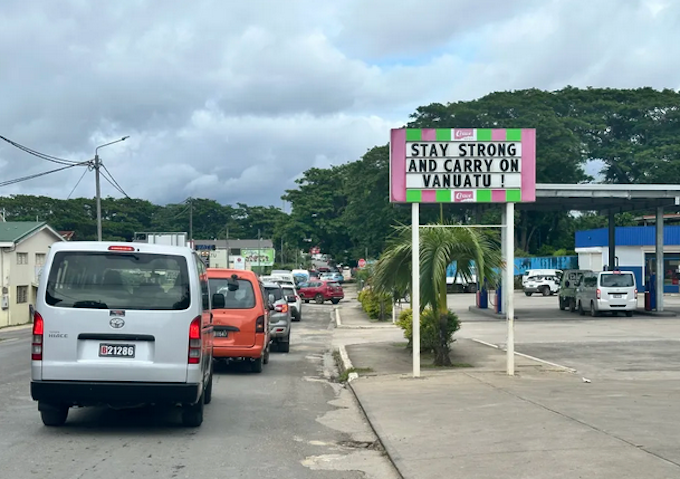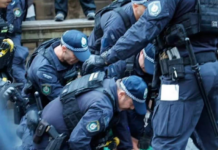
By Koroi Hawkins, RNZ Pacific editor in Port Vila
Today marks one month since a 7.3-magnitude earthquake struck Vanuatu’s capital, Port Vila, claiming 14 lives, injuring more than 200 people, and displacing thousands more.
Downtown Port Vila remains a no-go zone.
Star Wharf, the international port, is still out of action and parts of the city and some of the villages surrounding it still have not had their water supply reconnected.
- READ MORE: Vanuatu polling underway in snap election one month after quake
- Vanuatu election: Preparation almost complete for snap ballot
- Other Vanuatu election reports
The Recovery Operations Centre estimates around 6000 workers from 200 businesses that operate in the CBD have been impacted.
All the while, loud rumbling tremors continue to rock the city; a recent one measuring above magnitude 5 on the Richter scale.
Leinasei Tarisiu lives outside of Vila but came in to vote in the snap election yesterday. She said children in her household still panic when there is an earthquake, even if it is small.
“They are still afraid. Even last night when we had that one that happened, we all ran outside,” she said.
“It’s hard for us to remain in the house.”
Ongoing trauma
The only mental health specialist at Vila Central Hospital, Dr Jimmy Obed, said the ongoing seismic activity is re-traumatising many.
Obed said as things slowly returned to something resembling normalcy, more people were reaching out for mental health support.
“What we try and tell them is that it’s a normal thing for you to be having this anxiety,” he said.
“And then we give them some skills. How to calm themselves down . . . when they are panicking, or are under stress, or have difficulty sleeping.
“Simple skills that they can use — even how children can calm and regulate their emotions.”

Meanwhile, following yesterday’s snap election, preliminary counting and the transportation of ballot boxes back to the capital for the official tally continues.
Trenold Tari, an aviation worker who spoke to RNZ Pacific after he had cast his vote, said he hopes they are able to elect leaders with good ideas for Vanuatu’s future.
“And not just the vision to run the government and the nation but also who has leadership qualities and is transparent. People who can work with communities and who don’t just think about themselves,” he said.
Wanting quick rebuild
Many voters in the capital said they wanted leaders who would act quickly to rebuild the quake-stricken city.
Others said they were sick of political instability.
This week’s snap election was triggered by a premature dissolution of parliament last year; the second consecutive time President Nike Vurobaravu has acted on a council of ministers’ request to dissolve the house in the face of a leadership challenge.
Counting this week’s election, Vanuatu will have had five prime ministers in the last four years.
The chairperson of the Seaside Tongoa community, Paul Fred Tariliu, said they have discussed this as a group and made their feelings clear to their election candidate.
“We told our candidate to tell the presidents of all the political parties they are affiliated with — that if they end up in government and they find at some point they don’t have the number and a motion is brought against you, please be honest and set a good example — tell one group to step down and let another government come in,” Tariliu said.
Desperate need of aid
Election fever aside, thousands of people in Port Vila are still in desperate need of assistance.
The head of the Vanuatu Red Cross Society is looking to start distributing financial relief assistance to families affected by last month’s earthquake.

The society’s secretary-general, Dickinson Tevi, said some villages were still without water and a lot of people were out of work.
“We have realised that there are still a few requests coming from the communities. People who haven’t been assessed during the emergency,” Tevi said.
“So, we have made plans to do a more detailed assessment after this to make sure we don’t leave anyone out.”
Tevi said with schools due to restart soon, parents and families who had lost their main source of income were under a lot of stress.
In a release, Save the Children Vanuatu country director Polly Bank, said disasters often had the power to suddenly turn children’s lives upside down, especially if they had lost loved ones, had their education interrupted, or had been forced to flee their homes.
Critical for children’s recovery
“In the aftermath of any disaster, it is critical for children recovering that they are able to return to their normal routines as soon as possible,” she said.
“And for most kids, this would include returning to school, where they can reconnect with friends and share their experiences.”
She said at least 12,500 children in the country may be forced to start the new school year in temporary learning centres with at least 100 classrooms across the country damaged or destroyed.
It is back to business for Vanuatu today after the public holiday that was declared yesterday to allow people to go and vote.
Unofficial election results continue to trickle in with local media reporting an even distribution of seats across the country for the Leaders Party, Vanua’aku Party, Reunification Movement for Change and the Iauko Group.
But it is still early days, with official results a while away.
This article is republished under a community partnership agreement with RNZ.












































